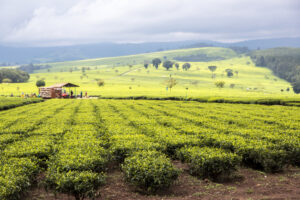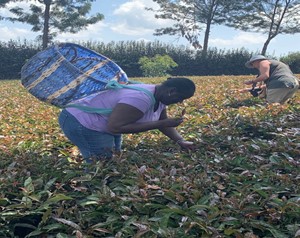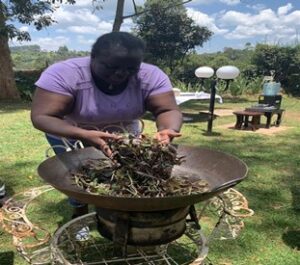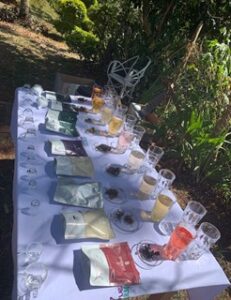Tourism can bring about economic benefits to any area – including rural communities with economies traditionally based in primary resource sectors such as agriculture. The National Agricultural Law Center in the USA defines agritourism as “a form of commercial enterprise that links agricultural production and/or processing with tourism in order to attract visitors onto a farm, ranch, or other agricultural business for the purposes of entertaining and/or educating the visitors and generating income for the farm, ranch, or business owner”. Since most agricultural lands are located in rural areas, agritourism is growing as an effective product that could be promoted in rural areas.

Tea farm in Kenya © Jen Watson – Shutterstock
In Africa, rural tourism is gaining momentum and recently was among the United Nations World Tourism Organization (UNWTO) priority focus for Africa in 2019. In fact, the UNWTO and the UN Food and Agriculture Organization (FAO) signed a Memorandum of Understanding that will see the two agencies work together to advance shared goals relating to the sustainable and responsible growth of rural tourism. Specific to Kenya, agriculture is identified as one of the country’s development goals of Vision 2030, however, this sector is under developed with major research gaps needing to be filled. As for tourism, the focus has primarily been on wildlife (safari) and beach tourism products.
Regional competition and the need for diversification
Agritourism scholars and practitioners recognize that nature-based products have the potential to attract more tourists. However, in light of the COVID-19 pandemic and continued economic challenges, there is a need to diversify the tourism products available. In Africa, regional competition between countries like Kenya, South Africa, Ethiopia, Uganda among others exasperates challenges for tourism operators. For example, there are already several other countries in Africa that are embarking on agritourism programs including Ghana, Zanzibar, South Africa, Botswana. Therefore, it is vital that Kenya takes quick action to position itself as one of the strongest destinations offering agritourism products. According to the secretary of Kenya Tourism Board (KTB), the marketing agency of tourism,
“Kenya is one of the largest producers and exporters of tea and cut flowers in the world and attracts a lot of interest in the country. Additionally, we are known for the best quality coffee which is loved globally. People want to understand what makes Kenya’s products special and farm tours give an opportunity to provide this information. We also want to show domestic tourists that there are many travel opportunities around them to explore”.
With this statement, there still needs a lot to be done to effectively promote agritourism as alternative product in the Kenya tourism industry. To gain better insights into the potential that the agritourism sector has to offer, I toured Gatura Greens – a Purple Tea Farm that has since diversified to offer activities and products for tourists.
Case Study Gatura Greens – Purple Tea Farm Tour
The Gatura Greens located in Muranga County is a premier commercial Purple tea farm in Kenya. They specialize in purple, orthodox and specialty tea. Purple tea has been around for two decades and is still receiving much attention in research from the Tea Research Institute in Kenya. Purple tea comes from purple bush and ferments after 3 hours. It contains anthocyanin that makes it purple. The leaves are not machine picked.



Author photos – picking (left) and fixation (middle) of tea to kill enzymes before the taste test (right)
The longer tea is rolled, the more it is infused. It’s perceived benefits includes: antioxidant and anti inflammatory properties; weight loss, good for skin, anti-ageing, treats/prevents diabetes, brings down cholesterol and pressure levels. The Gatanga industries have 100 acres of green bush, 20 acres of purple bush and 20 acres mature forest. The farm operated by two siblings started planting purple tea in 2015. The tour starts with a breakfast of different teas and homemade buns. This is followed by a brief history of tea then tourists are taken to the farm to learn and participate in picking the purple tea themselves. The tea is roasted (fixation) then rolled, roasted again and packed. The tourists are also taken through a bamboo forest and to a nearby waterfall for swimming. Lunch is served and tea tasting of different flavours are served.
Pathways toward successful agritourism in Kenya
By offering these tours, not only are they experiential (tea picking and tastings), but also offer educational aspects on how different teas are planted, harvested and prepared for export. There is also the added economic benefit of tourists buying the products on-site. Though just one example of many, the future success of agritourism development in Kenya will hinge on aspects of innovation, networking, diversification and marketing. Through effective engagement and capacity building with local farmers, there are significant prospects for entrepreneurship development and employment opportunities at the intersection of the agriculture and tourism sectors. The main challenges that prevail and require additional research to understand? Most farmers do not have the requisite knowledge or expertise to conduct effective agricultural/farm tours. Another challenge is marketing the farms as agritourism hubs coupled with a lack of capital and poor infrastructure also being a hindrance.

Dr. Roselyne Okech is a Professor, Tourism Studies at Grenfell Campus, Memorial University of Newfoundland in Canada. Her research interests are in culture and rural heritage development. She has written numerous articles appearing in international journals and has been recognized by several international awards.
Are you currently involved with regional research, policy, and development? The Regional Studies Association is accepting articles for their online blog. For more information, contact the Blog Editor at rsablog@regionalstudies.org.